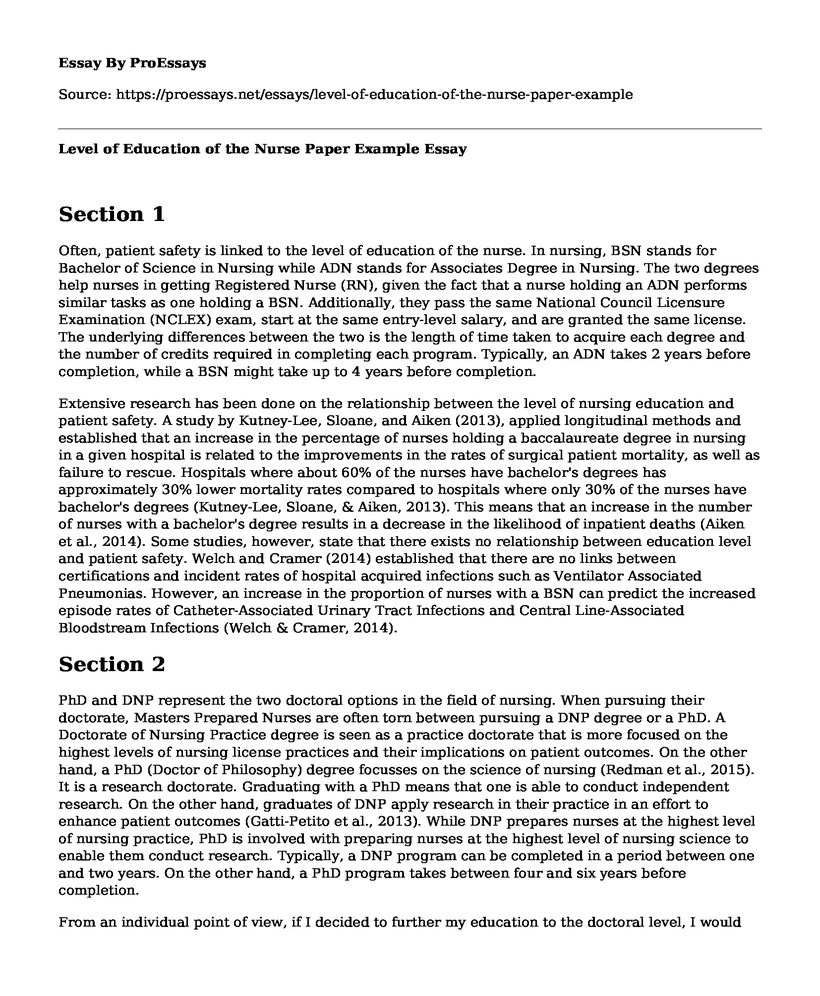Section 1
Often, patient safety is linked to the level of education of the nurse. In nursing, BSN stands for Bachelor of Science in Nursing while ADN stands for Associates Degree in Nursing. The two degrees help nurses in getting Registered Nurse (RN), given the fact that a nurse holding an ADN performs similar tasks as one holding a BSN. Additionally, they pass the same National Council Licensure Examination (NCLEX) exam, start at the same entry-level salary, and are granted the same license. The underlying differences between the two is the length of time taken to acquire each degree and the number of credits required in completing each program. Typically, an ADN takes 2 years before completion, while a BSN might take up to 4 years before completion.
Extensive research has been done on the relationship between the level of nursing education and patient safety. A study by Kutney-Lee, Sloane, and Aiken (2013), applied longitudinal methods and established that an increase in the percentage of nurses holding a baccalaureate degree in nursing in a given hospital is related to the improvements in the rates of surgical patient mortality, as well as failure to rescue. Hospitals where about 60% of the nurses have bachelor's degrees has approximately 30% lower mortality rates compared to hospitals where only 30% of the nurses have bachelor's degrees (Kutney-Lee, Sloane, & Aiken, 2013). This means that an increase in the number of nurses with a bachelor's degree results in a decrease in the likelihood of inpatient deaths (Aiken et al., 2014). Some studies, however, state that there exists no relationship between education level and patient safety. Welch and Cramer (2014) established that there are no links between certifications and incident rates of hospital acquired infections such as Ventilator Associated Pneumonias. However, an increase in the proportion of nurses with a BSN can predict the increased episode rates of Catheter-Associated Urinary Tract Infections and Central Line-Associated Bloodstream Infections (Welch & Cramer, 2014).
Section 2
PhD and DNP represent the two doctoral options in the field of nursing. When pursuing their doctorate, Masters Prepared Nurses are often torn between pursuing a DNP degree or a PhD. A Doctorate of Nursing Practice degree is seen as a practice doctorate that is more focused on the highest levels of nursing license practices and their implications on patient outcomes. On the other hand, a PhD (Doctor of Philosophy) degree focusses on the science of nursing (Redman et al., 2015). It is a research doctorate. Graduating with a PhD means that one is able to conduct independent research. On the other hand, graduates of DNP apply research in their practice in an effort to enhance patient outcomes (Gatti-Petito et al., 2013). While DNP prepares nurses at the highest level of nursing practice, PhD is involved with preparing nurses at the highest level of nursing science to enable them conduct research. Typically, a DNP program can be completed in a period between one and two years. On the other hand, a PhD program takes between four and six years before completion.
From an individual point of view, if I decided to further my education to the doctoral level, I would pursue a PhD program. While the two degrees reflect a high level of nursing practice and research, the DNP is a relatively new doctorate and is still struggling with gaining a similar level of prestige as that of a PhD (Keating, 2014). The focus, objectives, and career options provided by a PhD program are more attractive. In universities and hospitals, graduates with a PhD tend to outrank their DNP counterparts. However, compared to the DNP, it is lengthy and less flexible.
References
Aiken, L. H., Sloane, D. M., Bruyneel, L., Van den Heede, K., Griffiths, P., Busse, R., ... & McHugh, M. D. (2014). Nurse staffing and education and hospital mortality in nine European countries: a retrospective observational study. The Lancet, 383(9931), 1824-1830. Link: https://www.ncbi.nlm.nih.gov/pmc/articles/PMC4035380/
Kutney-Lee, A., Sloane, D. M., & Aiken, L. H. (2013). An increase in the number of nurses with baccalaureate degrees is linked to lower rates of postsurgery mortality. Health Affairs, 32(3), 579-586. Link: https://www.healthaffairs.org/doi/pdf/10.1377/hlthaff.2012.0504
Welch, C., & Cramer, E. (2014). The Effects of Nurse Education and Certification on Hospital-Acquired Infections. Link: http://archie.kumc.edu/xmlui/bitstream/handle/2271/1241/2271-334-JBSNR-2014-Welch.pdf?sequence=1Section 2: 3d2
Gatti-Petito, J., Lakatos, B. E., Bradley, H. B., Cook, L., Haight, I. E., & Karl, C. A. (2013). Clinical scholarship and adult learning theory: A role for the DNP in nursing education. Nursing education perspectives, 34(4), 273-276. Link: https://www.researchgate.net/profile/Barbara_Lakatos/publication/258279693_Clinical_Scholarship_and_Adult_Learning_Theory_A_Role_for_the_DNP_in_Nursing_Education/links/59b41b78a6fdcc3f88958dfb/Clinical-Scholarship-and-Adult-Learning-Theory-A-Role-for-the-DNP-in-Nursing-Education.pdf
Keating, S. B. (Ed.). (2014). Curriculum development and evaluation in nursing. Springer Publishing Company. Link: http://repository.embuni.ac.ke/bitstream/handle/123456789/1165/Curriculum%20Development%20and%20Evaluation%20in%20Nursing%20-%20Keating%2C%20Sarah%20B.%20%5BSRG%5D.pdf?sequence=1&isAllowed=y
Redman, R. W., Pressler, S. J., Furspan, P., & Potempa, K. (2015). Nurses in the United States with a practice doctorate: Implications for leading in the current context of health care. Nursing outlook, 63(2), 124-129. Link: https://s3.amazonaws.com/academia.edu.documents/45196224/Nurses_in_US_with_Practice_Doctorate.pdf?AWSAccessKeyId=AKIAIWOWYYGZ2Y53UL3A&Expires=1535540980&Signature=sfql%2BqGP9jqR68Y5r1ZvoG5SWRw%3D&response-content-disposition=inline%3B%20filename%3DNurses_in_the_U.S._with_a_Practice_Docto.pdf
Cite this page
Level of Education of the Nurse Paper Example. (2022, Jul 28). Retrieved from https://proessays.net/essays/level-of-education-of-the-nurse-paper-example
If you are the original author of this essay and no longer wish to have it published on the ProEssays website, please click below to request its removal:
- Paper Example: Chinese Students Studying Abroad and Marketing in Higher Education
- Lack of Healthy and Nutritious Food in Memphis Essay
- Rhetorical Strategies in "The False Comfort of Securing Schools" Essay
- Admission Essay Sample on Master's Program on Nursing
- Essay Sample on Sporting Risk Management Decisions
- Essay Example on Police Officers' Health: Disclosure Takes a Different Twist
- Business During and After Pandemic - Essay Sample







